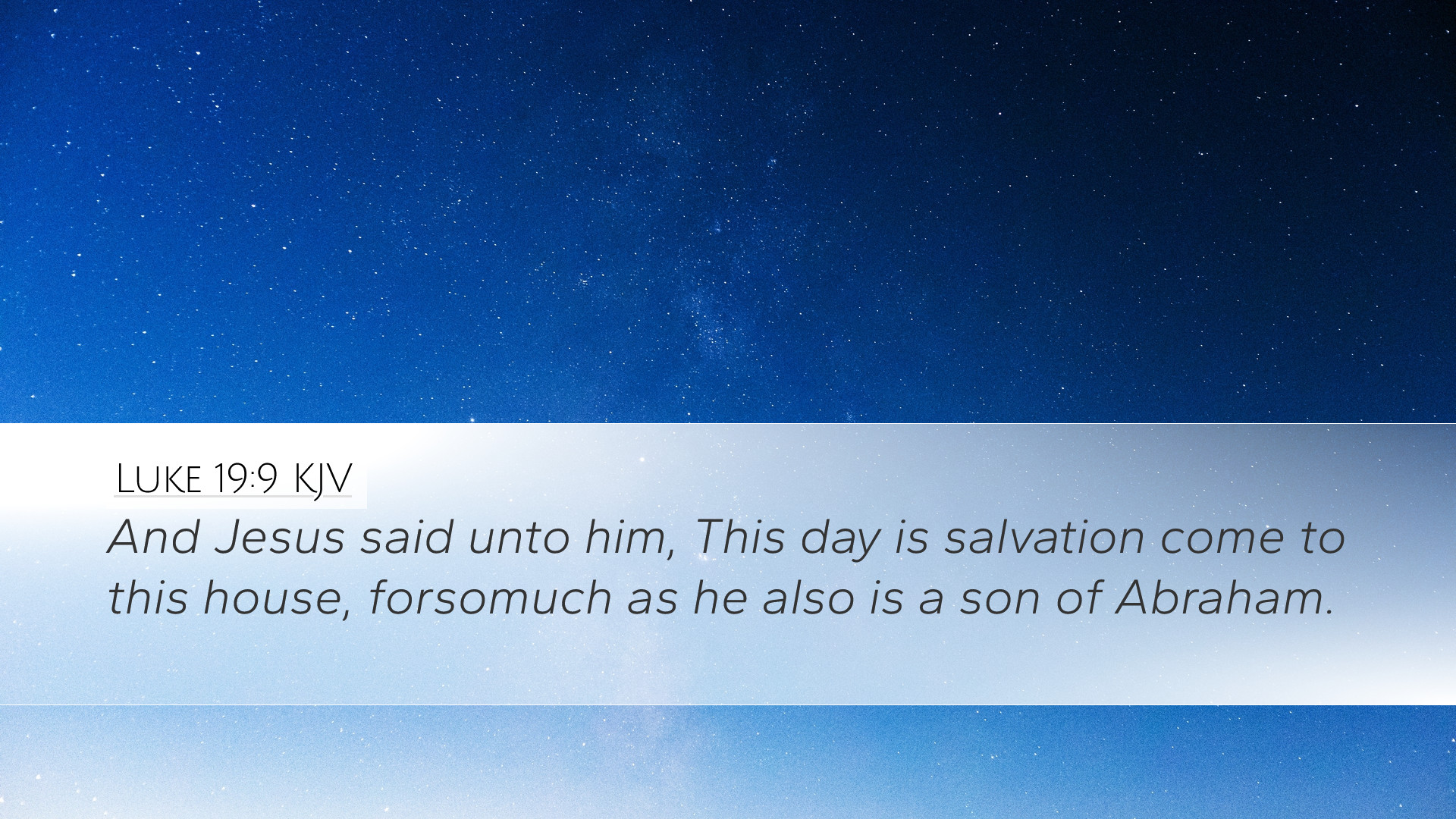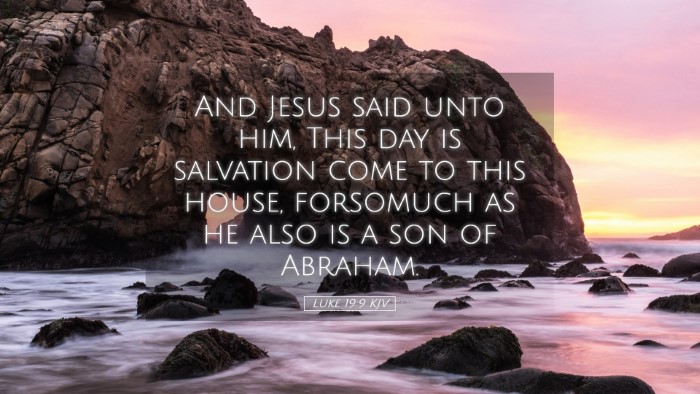Commentary on Luke 19:9
Luke 19:9 states:
"And Jesus said unto him, This day is salvation come to this house, forsomuch as he also is a son of Abraham."
Introduction
This verse occurs in the context of the encounter between Jesus and Zacchaeus, a chief tax collector. The narrative provides profound insights into the nature of salvation and the inclusivity of Jesus’ ministry. This commentary synthesizes insights from various public domain sources, offering rich theological reflections.
Contextual Background
To fully grasp the significance of Luke 19:9, it is essential to consider its surrounding context:
- Zacchaeus' Background: Zacchaeus, being a tax collector, occupied a position of both financial power and social stigma among the Jewish people. His profession made him a figure of disdain, often viewed as a traitor for collaborating with the Roman authorities.
- Jesus’ Mission: Throughout the Gospel of Luke, Jesus is depicted as reaching out to the marginalized and the sinners, illustrating God's grace that transcends societal boundaries.
Exegesis of Luke 19:9
The phrase "This day is salvation come to this house" indicates a decisive moment of transformation in Zacchaeus’ life. Let us explore various elements of this declaration:
Salvation Arrives
Jesus' announcement serves as a declaration of salvific grace. According to Matthew Henry, this phrase showcases the immediacy of salvation, emphasizing that it is accessible in the present moment. This stands in contrast to a merely future-oriented notion of salvation, inviting an immediate response.
Zacchaeus as a Son of Abraham
The designation "son of Abraham" establishes a profound theological connection. Albert Barnes elucidates that in Jewish thought, being a "son of Abraham" implies being a partaker of the covenant promises and community of faith. Zacchaeus' newfound faith legitimizes him as a member of God's chosen people.
The Significance of Heritage
This affirmation can be interpreted in two ways:
- Inclusivity of Faith: It highlights that lineage does not solely determine one's place in God’s Kingdom. The recognition that even a despised tax collector can belong affirms that salvation is available to all who believe (Romans 1:16).
- Restoration of Identity: For Zacchaeus, receiving this affirmation from Jesus reinstates his identity that had been overshadowed by his profession and societal rejection. Adam Clarke emphasizes that true belonging comes through faith and acceptance in Christ, regardless of past failures.
Theological Implications
The implications of this verse stretch far beyond Zacchaeus’ personal encounter. Several themes warrant careful consideration:
The Nature of Salvation
Salvation as presented in this verse is relational and transformative, not merely a transactional experience. Matthew Henry notes that true salvation involves a change of heart as evidenced by Zacchaeus’ subsequent actions—repentance and restitution.
The Role of Jesus
Jesus’ initiative in visiting Zacchaeus highlights His role as the seeker of the lost. This is a recurring theme in Luke's Gospel (Luke 19:10), where it states that the Son of Man came to seek and save that which was lost.
Response to Grace
In response to the grace extended to him, Zacchaeus demonstrates a radical transformation, showcasing the fruit of genuine repentance. It is noteworthy that he pledges to give half of his possessions to the poor and to repay those he has cheated fourfold. This aligns with the teachings on the ethical responsibilities of those who experience God’s grace (James 2:14-17).
Pastoral Applications
This verse invites several pastoral reflections:
- Preaching Salvation's Availability: Emphasizing that Jesus seeks out the lost and offers salvation to all is central to evangelistic efforts. There is no one beyond the reach of God’s grace.
- Encouraging Repentance: Pastoral leaders should guide their congregations toward recognizing the profound and transformative nature of authentic repentance, inspired by Zacchaeus' example.
- Fostering Community Inclusivity: Church communities should reflect the inclusivity of Jesus' ministry by welcoming those who may feel marginalized or unworthy. It is essential to create spaces where all individuals can encounter grace.
Conclusion
Luke 19:9 encapsulates the heart of the Gospel, demonstrating that salvation through Jesus is both immediate and transformative for all, irrespective of societal labels or sins. As pastors, students, and scholars meditate on this verse, they are encouraged to explore the depth of God’s grace available to every individual, facilitating transformative encounters that lead to true repentance and restoration.


